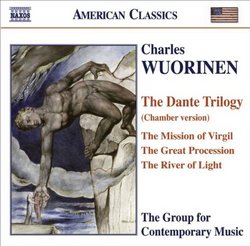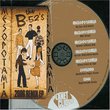| All Artists: Charles Wuorinen, The Group for Contemporary Music Title: Wuorinen: Dante Trilogy - The Mission of Virgil / The Great Procession / The River of Light Members Wishing: 1 Total Copies: 0 Label: Naxos American Classics Original Release Date: 1/1/2008 Re-Release Date: 1/29/2008 Genre: Classical Styles: Ballets & Dances, Ballets, Chamber Music, Historical Periods, Classical (c.1770-1830) Number of Discs: 1 SwapaCD Credits: 1 UPC: 636943934524 |
Search - Charles Wuorinen, The Group for Contemporary Music :: Wuorinen: Dante Trilogy - The Mission of Virgil / The Great Procession / The River of Light
 | Charles Wuorinen, The Group for Contemporary Music Wuorinen: Dante Trilogy - The Mission of Virgil / The Great Procession / The River of Light Genre: Classical
|
Larger Image |
CD DetailsSimilar CDs
|
CD ReviewsWuorinen Ballet on Naxos Robin Friedman | Washington, D.C. United States | 03/24/2008 (5 out of 5 stars) "I have been learning a great deal from listening to and reviewing recordings of contemporary American music in Naxos's "American Classics" series. This recently-released CD of the "Dante Trilogy" was my first experience with the music of Charles Wuorinen (b.1938).Wuorinen received the Pulitzer Prize in 1970 and also has received a MacArthur Fellowship. He has composed over 240 works. The "Dante Trilogy" consists of three separate ballets composed between 1993 and 1996, each of which is based upon a book of Dante's Divine Comedy. Wuorinen also wrote a version of this piece for full orchestra. I found the chamber music version of this work, which is recorded on this CD, intruiging in its scoring. The first ballet, "The Mission of Virgil", based on the Inferno, is scored for two pianos. The second ballet, "The Great Procession" is based upon Dante's Purgatorio and is scored for an ensemble of six. The final ballet, "The River of Light", based upon Paradiso is scored for a 13-member chamber ensemble. This music is atonal, dissonant, and difficult. It is also highly and complexly organized with interrelationships in musical language, themes, and rhythms among the various sections of a ballet. The work is astringent but rewarding. The detailed program notes included with the CD explain the connections with Dante's text as well as giving an idea of the intricacy of the scores. During my listening, I tried to imagine the staging of this music as a ballet, but I also, at times, put the ballet out of mind and tried to concentrate on the music itself. The eight-movement "Mission of Virgil" tells of Dante's descent into and departure from Hell. Wuorinen offers scenes of wandering and depictions of beasts, monsters and of Satan. There are also meditative moments in this work. I found the two-piano scoring unusual and effective. The eleven-movement "Great Procession" is devoted to a single scene in Purgatorio with seven aspects of the procession interspersed with a short, energetically recurring refrain. There is significance to the numerology of this piece and a great deal of allusiveness in the recurring themes of the music. The centerpiece of the work is a movement titled "The Griffin", which is a meditation on Dante's depiction of Jesus. The final ballet, "The River of Light" is cast in the form of a long, continuous movement with subsections. Moments of calm are juxtaposed against music of strong rhythm and agressiveness. The piano and the percussion seem to dominate in much of this work, although it also includes chorale-like passages for wind and strings. The Dante Trilogy is is a taut, highly organized work performed here by members of the Group for Contemporary Music, an organization which Wuorinen himself established. It made me interested in hearing other works by Wuorinen that are also available on Naxos. Adventurous listeners wanting to explore contemporary American music will enjoy this CD. Robin Friedman" So-so Wuorinen Personne | Rocky Mountain West | 04/28/2008 (3 out of 5 stars) "When I put Wuorinen on the player, I expect music that moves rapidly back and forth with bracing complexity. In this set, it feels as if he's always pulling his punches. I suppose this is the result of writing for ballet, where the dance is the focus. Where Wuorinen the composer might jump into a new texture, Wuorinen the dance musician stays within the needs of the tableau. There are more marches and processionals here than in all the rest of his music put together. It can become tiresome unless you're in the mood for such a thing. I haven't yet found myself in that mood.
Charles Wuorinen is a fine composer, but the Dante Trilogy does not show him at his best. Perhaps the music works when there's a dance to watch. But by itself, it just doesn't add up to much." |

 Track Listings (20) - Disc #1
Track Listings (20) - Disc #1


